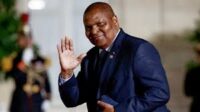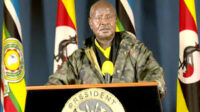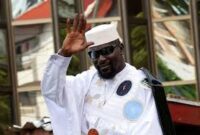Ugandan military operations in the Democratic Republic of the Congo (DRC) are raising questions over whether the true motivation is security or commercial gain. On June 5, 2025, Ugandan soldiers entered Kasenyi and Tchomia, towns in Ituri province, far from the original zones of operation against the Allied Democratic Forces (ADF). General Muhoozi Kainerugaba, Uganda’s army chief, shared a video online showing residents welcoming the troops, while military spokesperson Chris Magezi described the areas as now “occupied.”
Initially, Uganda’s deployment to eastern DRC in 2021 was framed as a joint mission with Congolese forces to fight the ADF, a rebel group with Ugandan roots that had aligned itself with the Islamic State Central Africa Province. However, the group has since scattered and is not currently active in Ituri, the region Uganda is now increasingly occupying. Despite this, Uganda has significantly expanded its military footprint in areas where ADF has little or no presence.
In February, General Kainerugaba posted on social media that Uganda would now secure its entire border with DRC, stating, “That is our sphere of influence. Nothing will happen there without our permission.” Kainerugaba has also publicly shown support for the M23 rebel group, which continues to hold territory in eastern DRC, including major urban centers like Goma and Bukavu. M23 is widely reported to be backed by Rwanda and Uganda, though both countries deny the allegations.
Ugandan officials say their presence in eastern DRC is aimed at protecting both local populations and Uganda’s economic interests. Army spokesperson Felix Kulayigye emphasized the importance of regional stability for Uganda’s commerce, stating, “Can commerce take place where there is instability? If we have commercial interests in eastern DRC, are those protectable or not?” Uganda’s military presence is also linked to an agreement with Kinshasa that allowed road construction to connect key towns and enhance trade between the two countries. While the full details of that agreement remain undisclosed, the deployment of troops and infrastructure has followed swiftly since 2021.
Analysts like Solomon Asiimwe, a lecturer at Nkumba University, argue that Uganda’s actions have always had an economic dimension disguised under the banner of national security. Regional trade with eastern DRC has boomed, with Uganda securing a 68% share of nearly $3 billion in regional exports over the past three years. However, the growth of this trade has come with allegations of illegal resource exploitation, including smuggling of minerals like gold, cocoa, and coffee. Uganda’s gold exports hit $3 billion in 2024, despite lacking significant domestic deposits, raising suspicions about the true source of the gold.
In 2022, the International Court of Justice ordered Uganda to pay $325 million in reparations to the DRC for the illegal exploitation of resources during its previous military occupation between 1998 and 2003. Uganda has been paying the reparations in installments.
Despite Ugandan claims that their extended operations in Ituri were requested by Congolese authorities, analysts in Kinshasa are skeptical. Conflict researcher Reagan Miviri of the Ebuteli think tank said Uganda has no formal agreement for operations in many parts of Ituri, calling it a violation of Congolese sovereignty. He believes Kinshasa remains silent not out of approval, but due to strategic caution, choosing not to confront Uganda and Rwanda simultaneously.
The increased Ugandan military presence has drawn comparisons to past interventions in DRC during the Congo wars of the 1990s, when Uganda and Rwanda backed rebel groups and later turned against the Congolese government. Both nations were accused of looting resources and targeting civilians. Many of the actors from that period remain influential today. Commanders of the M23 rebel group have ties to military figures like Rwanda’s James Kabarebe, who played a key role in those earlier conflicts and is currently under U.S. sanctions.
Experts argue that the situation unfolding today mirrors the 1990s regional powers exploiting instability in eastern DRC under the pretext of security while pursuing economic and territorial influence. While Uganda and Rwanda justify their operations as necessary to counter groups like the ADF and FDLR, critics say they are once again carving out zones of control and extracting resources from Congolese soil.
The cost of these interventions continues to fall on civilians. The United Nations reported in April 2025 that renewed fighting, particularly involving M23, has displaced nearly four million people across North and South Kivu. Amid the growing humanitarian crisis, questions linger over Uganda’s real intentions in the DRC. “I don’t believe that Uganda has good intentions, especially in the operation in Ituri,” Miviri said.














Leave a comment